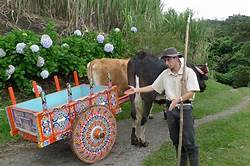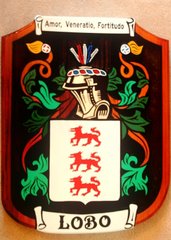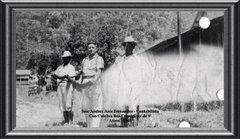SPANISH, then ENGLISH:
La Nación de Costa Rica: 17 de Agosto, 1988:
Don Camilo Lobo cumple 102 años y no acepta bordón!
Gerardo Chaves corresponsal de La Nación
Camilo Lobo y Fulvia Arce de Lobo
(Familia Lobo Avila - mi padre Gerardo en su infancia, nieto de Camilo Lobo)
FIRST IN SPANISH, THEN IN ENGLISH
FIRST IN SPANISH, THEN IN ENGLISH
" No, no, van a creer que estoy muy viejo si me ven con eso" manifesto don Camilo Lobo Esquivel, quien el 18 de julio pasado cumplio 102 anos, ante la sugerencia de su nieta Mayra Lobo respecto a que utilice un bordón para caminar con mas seguridad.
 |
| (Mayra Lobo, nieta de Camilo y Fulvia Lobo) |
"Asi es papa" dice dona Mayra respecto al abuelo paterno que la crio. "Pregunta por una señora que tiene 80 anos y se refiere a ella como "la viejita", le gusta estar cerca de las ventanas para ver pasar a las muchachas, pues no ha perdido su gusto por las mujeres, come muy bien y pasa muy risueno.
Hoy la memoria ya falla y en la conversación con don Camilo, pese a lo agradable que results, faltan los detalles de casi un siglo de experiencia , de los que muy pocos datos se conservan.
Cuando logra romper el velo del olvido, don Camilo habla de su San Rafael de Heredia natal, donde siendo pequeño tenia que ir a recoger las vacas, colaborar en el ordeno y luego ir a la Ciudad de las Flores a entregar la leche, ademas de que al regreso llevaba alguna compras. "Había muy poca gente alli, en San Rafael, "ahora hay mucha", comenta, y luego salta a su viaje a El Cacao de Alajuela, a los 15 anos, junto con sus tios.
(Horacio Lobo, nieto de Camilo Lobo con la hija de Camilo Lobo, Dona Marina)
De pronto surge otro nombre: Santa Clara, algún punto situado hacia el este de la Cordillera Central, al que se dirigio siendo pequeno , atravesando la selva, para ir a "tapar frijoles. Eso alla por Guapiles".
"Si Fulvia, la recuerdo, era mi mujer", comenta don Camilo de su esposa, dona Fulvia Arce Saenz, originada de Santo Domingo de Heredia, con quien se caso cuando vivían en El Cacao y con quien procreo 18 hijos, de los cuales 11 murieron a temprana edad.
Los recuerdos incluyen el momento en que se hizo acompañar por un tio para ir a solicitar a don Blas, quien se convertiria en su suegro, la mano de dona Fulvia. El suegro en ciernes hizo a don Camilo picar una carreta de lena y cumplir otras labores que lo convencieron de la valia del futuro yerno y alli quedo finiquitado el asunto.
Dona Fulvia tocaba la guitarra , pero en una situación economica muy dificil don Camilo cambio el instrumento por una cajuela de frijoles, semilla de la cual derivo una cosecha tab buena que le permitio adquirir una finquita en El Cacao de Alajuela, la que seria fuente de sosten y la residencia para la familia.
Claro que pudo recurrir a su suegro para que le facilitara algún dinero, pero preferio es sacrificio a doblegar el orgullo, y al final de cuentas no salio malo el cambio de una guitarra por una finca.
LA CARRETA

Le cupo a don Camilo participar en las largas jornadas carreteras a que obligaban el transporte del cafe a Puntarenas, viajes duros que forjaron el desarrollo agrícola y economico del pais.
De igual manera, era la carreta el medio al que recurría para sacar al mercado josefino la produccion de pina de su finca, lo que requeria de un viaje en el que habia que hacer una parada de sesteo en El Barrial de Heredia.
Don Gonzalo Lobo Arce, uno de los hijos de don Camilo, recuerda que acompañaba a su padre en los viajes a San Jose, el retorno de los cuales llevaba algunas de las cosas basicas.
También fue la carreta el vehiculo para transportar buena parte de loas materiales del primer templo catolico de El Cacao, obra que don Camilo tiene dentro de las mas importantes que desarrollo para la comunidad.
Le correspondió al hoy centenario anciano fungir tambien como mayordomo del templo que ayudo a construir.
Coger cafe con mateado, utilizando una tela pegada con cuatro estacas y tirando los granos sobre ella, forma parte de los recuerdos de don Camilo, quien ahora, con muy buen espíritu lleva una vida sana, dedicada la mayor parte del tiempo a comer y dormir, como afirma dona Mayra, a quien el anciano ha confiado que va a vivir "104 anos" una meta que no parece lejana para quien a los 102 anos se rehusa a emplear ayudas para caminar.
(Familia de Gerardo y Marta Lobo y sus hijos Martha, Mark, el finado Roberto, Carlos y Luis)
IN ENGLISH
"No, no, they're going to believe I'm too old if they see me with that," said Don Camilo Lobo Esquivel, who turned 102 on July 18, at the suggestion of his granddaughter Mayra Lobo about using a walking stick for more security.
"That's the way he is," says Mayra, referring to the paternal grandfather who raised her. "He asked about a lady who is 80 years old and refers to her as "the old lady", he likes to be near the windows to watch the girls go by, he has not lost his taste for women, he eats very well and is always very positive.
Today the memory begins to fail and in the conversation with Don Camilo, in spite of how pleasant it is, the details of almost a century of experience are missing, of which very few are conserved.
When he manages to break the veil of oblivion, Don Camilo speaks of his native San Rafael de Heredia, where as a child he had to go to collect the cows, milk the cows, and then go to the City of Flowers to deliver the milk, in addition to that, on his return, he made some purchases. "There were very few people there, in San Rafael, there is now a lot", he says, and then he jumps on to his trip to El Cacao de Alajuela, at 15, along with his uncles.
And soon another name arises: Santa Clara, a point located towards the east of the Central Mountain Range, to which he was directed being small, crossing the jungle, to go to "cover beans, from there for Guapiles".
"Yes Fulvia, I remember her, was my wife," says Don Camilo of his wife, Fulvia Arce Saenz, a native of Santo Domingo de Heredia, with whom she married when they lived in El Cacao and with whom she procreated 18 children, of whom 11 died at an early age.
The memories include the moment when he was accompanied by an uncle to go and ask Don Blas, who would become his father-in-law, for the hand of dona Fulvia. The future father-in-law made Don Camilo chop a cart of firewood and perform other tasks that convinced him of the worth of the future son-in-law and there the matter was settled.
Dona Fulvia played the guitar, but in a very difficult economic situation Don Camilo exchanged the instrument for a barrel of beans, seed from which derived a crop so good that it allowed him to acquire a small farm in El Cacao de Alajuela, which would be a source of sustenance and residence for the family.
Of course, he could have asked his father-in-law to provide him with some money, but he preferred to save face, and at the end of the day the exchange of a guitar for a farm was a good one!
THE OX CART
Don Camilo took part in the long journeys that transported coffee to the port of Puntarenas, difficult trips that forged the agricultural and economic development of the country.
Similarly, the ox cart was the means to which he resorted to take the production of pineapple from his farm to the Josefino market, which required a trip in which he had to make a stop at El Barrial de Heredia.
Don Gonzalo Lobo Arce (my grandfather), one of Don Camilo's sons, remembers accompanying his father on trips to San Jose, the return of which brought basics back home.
The ox cart was also the vehicle to transport a good part of the materials of the first catholic temple of El Cacao, a work that Don Camilo has among the most important that he developed for the community.
He also served as steward of the temple that he helped to build.
Harvesting coffee with broad-cloth, using a cloth stuck with four stakes and throwing the grains on it, is part of the memories of Don Camilo, who now, with a very good spirit leads a healthy life, dedicated most of the time to eating and sleeping, as Dona Mayra affirms, to whom the older gentleman has confided that he will live "104 years" a goal that does not seem far away for those who, at the age of 102, refuse to use walking aids.
In the final analysis, your attitude determines your effectiveness in everything, every time! LGL www.LuisLobo.Biz











